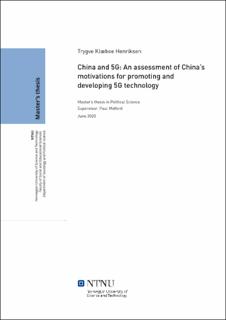| dc.contributor.advisor | Midford, Paul | |
| dc.contributor.author | Henriksen Klæboe, Trygve | |
| dc.date.accessioned | 2021-09-28T17:32:40Z | |
| dc.date.available | 2021-09-28T17:32:40Z | |
| dc.date.issued | 2020 | |
| dc.identifier | no.ntnu:inspera:53627983:37108144 | |
| dc.identifier.uri | https://hdl.handle.net/11250/2784515 | |
| dc.description.abstract | Denne oppgaven undersøker Kina’s motivasjoner for å utvikle og promotere 5G teknologi. På den ene siden kan motivene være knyttet mot kommersielle og økonomiske mål. På den andre siden kan de være knyttet mot defensive eller offensive militære mål. For å undersøke dette utledes det tre hypoteser fra teori om internasjonale relasjoner, to fra realisme, og en fra liberalisme. Offensiv realisme argumenterer for at motivasjonene er knyttet til å maksimere makt. Defensive realisme argumenterer fra Kina sine motiver er å opprettholde eller maksimere sin egen sikkerhet. Den liberale hypotesen argumenterer for at Kina sine motivasjoner er å fortsette sin økonomiske vekst, og maksimere velstand. Resultatene viser at Kina kan bruke, utvikle og promotere 5G teknologi både for offensive og defensive militære formål, og for å fortsette sin økonomiske vekst å maksimere velstand. Analysen og diskusjonen viser at det er vanskelig å identifisere Kina’s motivasjoner med stor nøyaktighet. Det er sannsynlig at Kina søker en kombinasjon av dette, og at 5G er en del av en strategi for å nå disse målene. Beslutningstakere bør utvise forsiktighet når det gjelder Kina og 5G, men ikke automatisk anta det verste. | |
| dc.description.abstract | This thesis examines China's motivations for developing and promoting 5G technology. On one side, the motives can be tied to commercial/economic goals. On the other side, the motives could be related to defensive or offensive military objectives. Three hypothesis is derived from theories in international relations to explore this. Two from realism, and one from liberalism. Offensive realism aruges that the motivations are related to power maximization. Defensive realism argues that the motives are related to maintaining or increasing security. The liberal hypothesis argues that the motives are related to economic growth and maximization of wealth. The results shows that China can use, develop, and promote 5G technology for both offensive and defensive military purposes, and to continue its economic growth and maximize its wealth. The analysis and discussion shows that it is hard to identify China's motivations with great certainty. It is likely that China seeks a combination of this, and that 5G is part of a strategy to achieve these goals. Policymakers should be cautious towards China and 5G but should not automatically assume the worst. | |
| dc.language | eng | |
| dc.publisher | NTNU | |
| dc.title | China and 5G: An assessment of China’s motivations for promoting and developing 5G technology | |
| dc.type | Master thesis | |
